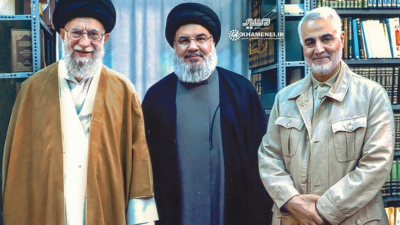Introduction
Below I have produced a glossary of Arabic terms that are used in this blog.
| Ahl al-bayt. | Lit., the people of the house; members of the household of Prophet including, ‘Alī, Fāt̩ima, Ḥasan, Ḥusayn and their progeny. |
| ‘Ālim (pl., ‘Ulamā’ | A learned man, specifically a scholar in Islamic religious sciences. |
| Ans̩ār | Lit., helpers. Name given collectively to those Medinese who supported the Prophet after his migration (hijra) from Mecca to Medina, as distinct from the muhājirūn. |
| Bay‘a | Recognition of authority, especially the act of swearing allegiance to a new sovereign or spiritual leader. |
| Dīwān | A public finance register; a government department. |
| Faḍl | Moral excellence. |
| Fiqh | The technical term for Islamic jurisprudence; the science of law in Islam |
| Fitna | Temptation, trial, enchantment, civil, war, strife. |
| Ghadīr Khumm | A Shī‘ī day of celebration for what they consider to be Prophet Muh̩ammad’s adoption of ‘Alī as his successor. |
| Ghayba | Lit., absence; the word has been used in a technical sense for the condition of anyone who has been withdrawn by God from the eyes of men and whose life during that period of occultation may be miraculously prolonged. |
| Ḥadīth | A report relating an action or saying of the Prophet, or the corpus of such reports collectively, constituting the second sources of Islamic law. For Shī‘as, it generally also refers to the actions and sayings of the Imāms. |
| Hayra | Confusion. |
| Hijra | The migration of the Prophet and his family from Mecca to Medina in 622. This became the first year of the Islamic calender. |
| Imām | Leader of a group of Muslims in prayer; the supreme leader of the Muslim community. The title used by the Shī‘īs in reference to the legitimate successors to the Prophet. |
| Kalām | Lit., speech. Refers to scholastic theology. |
| Khalīfa (caliph) | The successor of the Prophet and the head of the Muslim community in the Sunnī model; the caliph. |
| Khurūj | Revolution, revolt, rebellion. |
| Mas‘um | A person who possesses infallibility, freedom from committing sins. |
| Mahdī | The rightly guided one; a name applied to the restorer of the true religion and justice who, according to a widely held Muslim belief, will appear and rule before the end of the world. Shī‘īs believe in a temporary absence ( occultation) of the Mahdī and his eventual return (raj‘a) in glory. |
| Muhājirūn | Lit., emigrants; Name given collectively to those Meccan followers of Prophet Muh̩ammad who accompanied him in his emigration from Mecca to Medina as distinct from the ans̩ār. |
| Mihna | An inquisition, for example the inquisition of the Caliph Ma’mūn. |
| Nas̩s̩ | Explicit designation of a successor by his predecessor, particularly relating to the Shī‘ī view of succession to the Imāmate, whereby each Imām, under divine guidance, designates his successor. |
| Raj‘a | Lit., ‘return’; the word has been used in a technical sense to denote the return or reappearance of a messianic personality, specifically one considered as the Mahdī. |
| Ridda | Lit., ‘return’ and by extension, ‘apostasy’ referring especially to the efforts of the Arab converts to Islam who sought to renounce their allegiance after the Prophet’s death. |
| Sābiqa | Precedence of priority in Islam, especially through early conversion. |
| Sharī’a | Lit., the way; referring to divine guidelines for moral and ethical behaviour, usually translated as ‘religious law’. |
| Shūrā. | Consultation. |
| Sīra | Biographical narrative of the Prophet Muh̩ammad. |
| Tafsīr | Commentary and interpretation, the exegesis of the Quran. |
| Umma | Community, any people as followers of a particular religion or prophet; in particular, the Muslims as forming a religious community. |
| Waṣī (pl. awṣiyā’) | Linguistically a wasī is a person who receives a legacy via a Will. In the Imāmī Shī‘īsm, a wasī is a successor who received divinely inspired spiritual authority from his predecessor. ‘Alī was the first wasī (via the Prophet), and the Imāmate was then transferred to his (and Fāt̩ima’s) descendants. Each Imam, under divine guidance, designated his successor. It was the function of the awṣiyā’ to interpret and explain the message brought by the prophets. |
| Waṣiyya | Appointment of a testamentary executor or guardian In the Shī‘ī religious paradigm the term is synonymous with nas̩s̩. |
Bibliography
Afsaruddin, A, The First Muslims: History and Memory (Oneworld Publications, 2008)
Berkey, J, The Formation of Islam: Religion and Society in the Near East, 600-1800 (Cambridge: Cambridge University Press, 2003)
Black, A, The History of Islamic Political Thought: From the Prophet to the Present (Edinburgh: Edinburgh University Press, 2011)
Daftary, F,The Isma’ilis: Their History and Doctrines (Cambridge: Cambridge University Press, 2007)
Encyclopaedia of Islam, 2nd Edition. Peters, R., “Waṣiyya”,
Lapidus, I, A History of Islamic Societies (Cambridge: Cambridge University Press, 2012)
Modarressi, H, Crisis and Consolidation in the Formative Period of Shiʻite Islam: Abū Jaʻfar Ibn Qiba Al-Rāzī and His Contribution to Imāmite Shīʻite Thought (Princeton: Darwin Press, 1993)
Netton, I, A Popular Dictionary of Islam (London: Routledge, 2006)
Al-Shamsi, M, Islam and Political Reform in Saudi Arabia: The Quest for Political Change and Reform (New York: Routledge, 2012)
https://iis.ac.uk/what-shia-islam (Accessed 5 June 2019)





